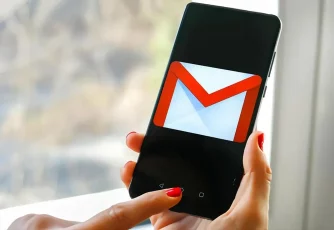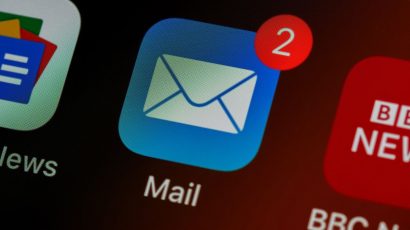As smartphones and social media gained prominence in the world over the last few years, many thought that WhatsApp messaging would render emails (the killer app that brought the Internet into the mainstream three decades ago, give or take) a thing of the past. Well, email is still around, and it’s more vital than ever. The new means of communication didn’t kill emails; they just gave it a specific niche for which it’s irreplaceable.
If you need an account in the currently ubiquitous cloud services, confirm your identity at Amazon or send a love letter; WhatsApp, Telegram, or Facebook won’t do. Email is still indispensable, and emails are still where our most sensitive information is stored.
But there’s one thing about emails. They’re a two-way identifiable communication system. It’s in the core design, and it was supposed to be like that from the beginning.
So how much information are you giving up about yourself when you send an email? Your email address is a prominent piece of data, of course. But that’s not the only thing you should keep in mind. Emails include a lot of information that can identify you in several ways.
For example, suppose that you read the entire email header (which most clients won’t show you by default; you have to tinker a little to see it). The header is very technical, as it includes things as the sender’s IP address or the routing information for the message in question. In other words: using emails anonymously is not the default option, ever. It’s pretty hard, as a matter of fact.
But not to worry. Sending anonymous mail is possible, and in this article, we will show you how.
How to send an anonymous email – The quick guide
Rendering an anonymous email means suppressing two critical pieces of data: your email address and your IP address. This needs a secure email service. No, you can’t use Gmail, Hotmail, nor Yahoo. These services are excellent because of their simplicity, availability, storage capacity, and many other features. But privacy is not their priority, so we’ll need a different provider for this task.
Here’s the simplest way to go:
- First, you need to choose a secure email provider. ProtonMail is the best option available today based on our extensive tests and research
- Register for ProtonMail (or the service of your choice) and get your mailbox
- Log into your private email account
- There you go! Now you have a new, safer email account
5 ways for sending an anonymous email without being tracked
So, you will want to have a private conversation using email. Fine, we can do that! There are several things you can do to meet this goal. However, there’s one thing you should keep in mind. There’s no silver bullet when it comes to this task. The best results will come by using two or more methods concurrently. Adopting one or more of the following methods will help you secure your email communications.
1. Use an encrypted and anonymous email provider
Encrypted email providers will give you a service that looks just like regular mail on the surface. But your outgoing messages will be encrypted end-to-end so that they will be much safer. The encryption extends to your emails, inbox, and contact list.
Encryption makes your emails look like random noise, white noise when it’s done at the best level. That prevents any external observer who could intercept them from making sense of them. So neither your ISP nor the government, and in some cases, even your email provider will be able to read your messages.
There are several anonymous email accounts on the web. Each offers a slightly different service with an emphasis on some features. These are the best ones available today:
- ProtonMail. It emphasizes security over anonymity, and it’s the best in this regard
- Tutanota. This one is all about anonymity
- StartMail. The easiest one to use
- Guerilla Mail. Provides temporary mails so that you can avoid spam
2. Use a burner email account
If you’ve seen TV shows like “The Wire” or “Breaking bad.” The “heroes” on these shows buy the cheapest phones, have them in prepaid plans, use them and then get rid of them. That way, they get all the advantages of mobile communications without leaving a trail that leads back to them. Burner emails are precisely like that.
These are email accounts that expire after a fixed period, or that will allow you to send an email without registering for an account. In either case, the message you send can’t be traced back to you. Another option is the AnonymouseMail which lets you send an utterly anonymized message to any receiver (but this option is send-only, you won’t be able to have an answer).
Burner emails are helpful to keep spam away from your real accounts when you need to register to fishy websites. However, any account you register using a burner email will be tricky to manage, especially if you need to reset a password using a link because those are usually sent to the registered email – which won’t exist anymore by then. So decide wisely and use burner emails for accounts that you know won’t be that important in the long run.
3. Hide your IP
You can encrypt a message, and nobody will be able to read its contents but the person on the other end with the decryption key. However, that email will still carry your IP address data, which could be a severe liability as your email address or external interception. So what can you do?
You can hide your IP address using three services: a proxy server, a virtual private network (VPN), or a Tor browser. Each option has advantages and disadvantages.
VPNs will route all your traffic (previously encrypted) through one of the servers in their network. The server will tell the world that your IP address is its own or one assigned by the network.
In most good VPNs, you can even choose the country you want your IP to come from. However, if you want your VPN to be actually safe, then you will need to choose one that adheres strictly to a no-logs policy – which means you have to pay for it; free VPNs keep logs of all your activities and sell them for profit.
The Tor browser is a network that relays web traffic through several nodes in a system maintained by volunteers. While it’s exceedingly slow, Tor connections and originating IP addresses are humanly impossible to trace back to their starting point.
If you are the really paranoid type of geek, then you’ll be happy to know that a quality VPN like NordVPN will allow you to use both technologies (VPN and Tor) at the same time. This high level of IP masking and encryption is probably unnecessary given the current state of the art, but it’s still good to know that it’s available.
Last but not least, you have the proxy server option. These servers will report your IP address as theirs, so they are very much like a VPN. Except that proxies do not provide encryption. Like in the VPN case, it’s essential to ensure that your service provider doesn’t keep any logs; otherwise, you’re not avoiding security and anonymity problems, just sweeping them under the rug.
4. Get rid of the metadata
OK, so now you have a ProtonMail account that you only use through your new NordVPN account with a Tor browser. If the “anonymous” email you’re sending includes a document with metadata that includes your name, phone number, address, and other vital stats, then what was the point in all those precautions?
If you include an attachment, especially an image, you need to ensure that you’ve stripped it bare of any EXIF data.
Windows users will be happy to know that a piece of software called “Document Inspector” removes all the metadata from a given document.
5. Sign up for a new email account
Simple solutions can be as effective as sophisticated ones. So you can always sign up for a new email account with Yahoo, Google, or Microsoft without worrying about encryption. Instead, you can simply provide a false name, home address, date of birth, skip the phone number (though that’s becoming increasingly harder to do), and send the anonymous mail you want.
The emails you send from this fake account will be anonymous insofar as your real name is concerned, but don’t forget the following things: your actual IP address will be in each message; also, don’t expect Google or Yahoo to treat you any differently just because you gave them fake data. They will still monitor your activities and provide the account’s information to law enforcement if required.
What is spoofed mail?
A question is probably on your mind right now: why can’t you just send an email without a sender address? The answer is: because the protocol requires one. It is not a helpful trick because, if you try it, you will get errors from the system, some servers will reject it, and the message itself will cause suspicions. However, there’s another way of doing things, and it’s called “spoofing.”
Spoofing is using a false sender address when you send an email. Spoofing is not too hard to do because SMTP (Simple Mail Transfer Protocol) doesn’t check the information in fields such as “From,” “Reply to,” or “Sender.” Also, the email address is not that important when you’re trying to track back an email address. The IP address, on the other hand, is crucial. In other words: spoofed mails can still be traced if they include an accurate IP address.
So how can you perform the whole trick of sending an utterly untraceable spoofed email? By using a VPN. A VPN will mask your IP address and assign you a new one from its network. Another option is to use a compromised server to send the email in question, but this option is more on the black-hat side of things, preferred by digital criminals or those who run malicious email campaigns, so we do not suggest that you use it.
Anonymous email: The top providers
As stated earlier, having an encrypted email provider is crucial if you want to have secure email communications. Here are the best ones in the industry:
1. ProtonMail
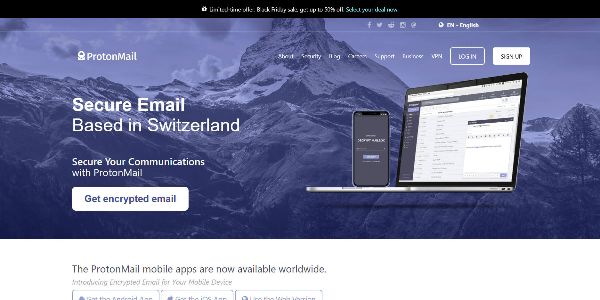
ProtonMail is the best secure mail provider in the world. Period. Every message gets PGP encryption before it leaves your device. In addition, the parent company espouses a strict no-log policy.
No-log policies are crucial in VPN and secure email providers. So how come, we hear you ask? First, every company has to have a headquarters somewhere. Second, suppose that somewhere happens to be one of the world’s jurisdictions in which a corporation must share client activity data with the government.
In that case, the corporation will do it because it’s its legal obligation. That means that your data goes to the government if it asks for it. So the only way to ensure that the company can fulfill its legal obligation without betraying your privacy and anonymity is for them to keep no records of your activity.
If it deletes your user data every time you finish a session, then it will have nothing to share with the government about you. And that is why zero-log policies are crucial.
But let’s go back to ProtonMail.
It offers a free plan and several paid subscriptions (starting at 4USD monthly). The fee gives you more secure messages per day. However, the most privacy-savvy won’t be too happy to learn that your account needs a phone number for confirmation.
Mission Impossible fans will also appreciate the self-destructing message feature of ProtonMail. Once a message is ready, you set an expiration time, and ProtonMail will do away with the messages.
Additional perks include free VPN service apps for Android and IOS and an encrypted calendar.
2. Tutanota
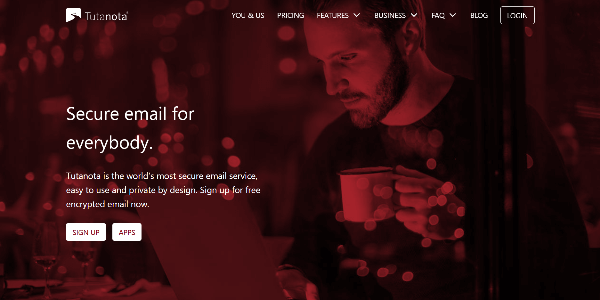
Tutanota supports end-to-end encryption for your emails. You can even send encrypted emails to users outside the Tutanota network if you need to. The encryption shuffles the info in your contacts as well as your inbox.
Some of our readers will be happy to know that signing up for a new account at Tutanota requires no identifiable personal information whatsoever. This provider deletes your IP address from every email you send (one of the critical and most challenging things to achieve in anonymizing emails).
Tutanota is an open-source project. So everybody can download and read the code, audit it, try it. This adds a degree of transparency that you seldom get with any email provider of any kind.
Tutanota has a service for every budget – even no budget at all. The free service gives you 1GB of storage, which is plenty if you’re not keen on attachments, but it has other limitations: your storage is good for four weeks only. On the other hand, if you want an encrypted calendar and unlimited email history, you can pay a subscription as cheap as 1.20 EUR monthly.
3. StartMail
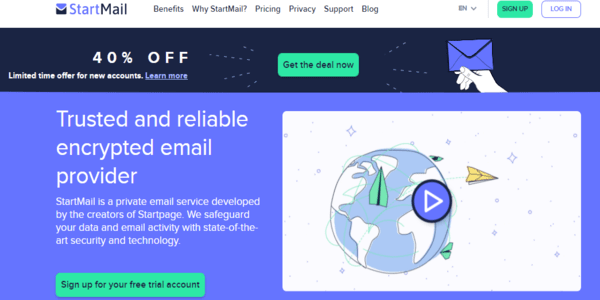
Imagine how Gmail could be if it cared about your privacy at all instead of finding new ways of delivering ads to you. That’s StartMail, a widely-used Gmail alternative. Its parent company also owns and operates StartPage, which is one of those rare search engines designed with privacy in mind.
Since privacy and anonymity are a priority in the company’s mission, StartMail offers one of the most private email services on the Internet. It supports burner emails, for instance, so that you can protect your mailbox with a virtual barrier.
There are two encryption options in StartMail. The standard option is to encrypt your message locally, then send it through HTTS. But it also supports PGP, which is a more popular option among the most enthusiastic encryption users. PGP, of course, requires that both the sender and the receiver exchange their public encryption keys in advance. Otherwise, one of the parties won’t be able to recover the message’s plain text.
4. Guerilla Mail
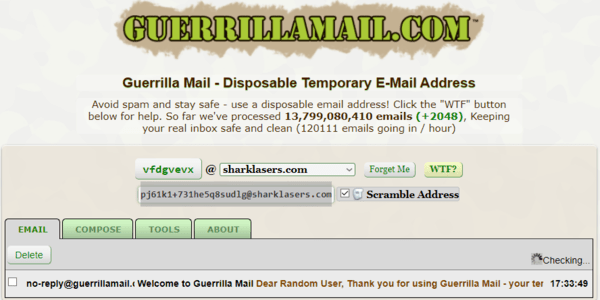
Guerrilla Mail is a top-rated anonymous email provider that’s been around since 2006.
It’s a different service from the others. It provides you with a disposable email address that allows you to send and receive emails anonymously. You can create the email address yourself or just let Guerrilla do it in your stead if you don’t have the time or the inclination to work out the details. You can even send emails without having an account, so things are even more accessible.
A Guerrilla Mail address is helpful when you want to open up a new account for a possibly fishy site in which you don’t wish to provide your actual email address. A nice byproduct of that is that you can use your Guerilla email account as a dumpster for unwanted spam emails that are the bane of online life or use when you do not trust a sender.
And it’s free! Guerilla has dealt with more than 13 billion emails, and the service is still up and running! The number of Guerilla users keeps growing steadily, and you could be the next one!
Why do you need an anonymous email?
The words “anonymous mail” maybe evoke mischievous behavior in your mind. But there are plenty of good, legitimate reasons to use anonymized email messages in some scenarios. Here are some of them.
Whistleblowers
Whistleblowers are always Davids fighting against Goliaths. They usually fight for justice against all odds, and they accept huge risks. The whistleblower can be fighting against crime, corruption, abuse, fraud, sexual harassment, or other violations of the law or human rights. As such, these digital Robin Hoods are usually popular with the public.
But the accused party is usually not very happy about being put in evidence, and they don’t just take it in the chin. So instead, they fight back, and because they tend to be more powerful than the whistleblower, they can channel massive resources against them, legal or otherwise. Hence, anonymity is a necessity for whistleblowers.
Journalists
Let’s face it. The press isn’t that free worldwide, least in those places where it’s needed the most.
Governments and big corporations do not enjoy exposing their secrets to the public because that makes them weaker, less powerful, or less profitable.
So journalists who are working on a big story need to protect their anonymity to communicate back and forth with their sources while they put the story together.
And that’s how anonymity helps investigative journalists to keep their work safe while it’s in the process, and it protects them from reprisals once it’s published.
Read also: Best VPNs for Journalists.
Avoid spam and tracking
Spamming is an industry. There are companies behind it. They go through all kinds of websites (like forums and discussion boards) and mailing lists to get every publicly available email address they can find.
Once they have the addresses, they use them in their bulk email marketing campaigns. If you don’t want your primary email address included in these annoying operations, then an anonymous or disposable email is indispensable when you’re signing up for accounts on suspicious sites.
But besides avoiding spam, there’s another issue. Just how much do you think that Apple, Google, or Facebook know about you? Of course, we all use their services all day long because they have a lot of practical value.
But these companies are gathering data on us continually, and they’re either analyzing it for profit or selling them to third parties who know how to monetize it. In this context, anonymous emails are a good measure against Big Tech learning too much about you.
Security and anonymity in email do matter
The usual big tech email providers do offer excellent services indeed. But privacy is not at the heart of their missions, and they even use your personal activities to target the ads they send your way – they pay their bills by selling advertising, and they need to analyze your browsing habits and even email contents to decide what are the ads that will work better for you. As a result, your privacy is not in the safest hands with those providers.
Additionally, the emails sent through the standard providers include the usual meta-data that goes out with every regular email. That includes your IP address, and anybody willing to read the whole header in the mail can find it out. So how bad is that data leak? Well, a competent hacker can figure out your physical location using your IP address up to your city, state, ZIP code, ISP, and even more details.
Final thoughts
The digital world has changed rapidly since the Internet transcended the academic world to become available to everybody. The email was the killer app that made it obvious why everybody should have Internet access when that process started.
Things have changed since then. First, smartphones appeared and changed the game. Telegram, WhatsApp, Line, and other messengers now provide communication services that are cheaper and faster than email. Even over the last couple of years in which the pandemic has pushed Zoom and other video conferencing tools to the surface, email remains a crucial tool that none of the new technologies can replace.
And precisely because email is so valuable and essential, there are circumstances in which having an anonymous email service is not only helpful but vital.
Spoofed emails can help protect your integrity and security if your work involves high risks. But even if you’re a more normal user, anonymous emails and similar services can still help you protect your primary email address so that it doesn’t become polluted by unwanted messages. Or simply so that it remains private enough that only the people you need to know it can use it, as it was in the beginning.
Fortunately, there are good anonymous email services around that can guarantee your privacy, anonymity, and safety when you need them. Moreover, they’re fast, cheap, and reliable, so there’s no excuse to avoid them if a situation calls for it.
We hope the information we presented you in this article will help you enhance your digital life by staying safe when it matters, thus increasing your peace of mind.
FAQs
It depends. If you send an email through Gmail’s web service, your IP address and hostname won’t leak. On the other hand, if you’re using Gmail as your email server in an email client such as Outlook or Thunderbird, then your IP address and hostname will be included in the message’s header. But the information in the last paragraph is relevant in ordinary circumstances only. So, for example, if Gmail must reveal your IP address in the course of a legal process, then it will disclose it to the authorities, even if the message itself didn’t carry it.
You can’t. The address in the “From” field is mandatory per the protocol rules, and you can’t leave it empty. What you can do, instead, is to use a false email address so that the receiver thinks it comes from somebody else. This trick is called “spoofing.” But do not forget that the domain in the fake address must be authentic; otherwise, spam filters will filter it.
No, you can’t. Outlook always associates an email account with a user or a sender. It’s built-in, so to speak, and you can’t bypass it. If the address in the “From” field doesn’t match the address associated with the Outlook user, you’ll get an error, and the message won’t leave your computer.
No, it’s not. Gmail observes your emails and online activity closely because that’s how it chooses the advertising that it will serve you. In this regard, anonymity works against Google’s business model, so you shouldn’t expect it. That being said, you can always have a Gmail account with false personal information. If, in addition, you always use a VPN to use that account, then your privacy will be as safe as it can be in Gmail.
By using a Tor or a VPN when sending the email in question. Both services will substitute your actual IP address with another one from the network. This will allow you to hide your IP address successfully.
A burner email account is a fully functional email account that is disposable. You can use it as many times as you’d like for any purpose you’d like. Then, when you’re done with it, you can dispose of it. Of course, it would be best if you didn’t keep any critical contacts on account of this type, and it ideally won’t be linked to your real name or other important accounts.
Google’s privacy policy is somewhat transparent, while Microsoft’s security settings are a mystery wrapped in a riddle wrapped in an enigma. Google’s options for authentication are far more advanced than Outlook’s (2FA is available), and it has other bonus features such as a separate junk folder. All things considered, Gmail is a better choice than Outlook, where security is concerned.

